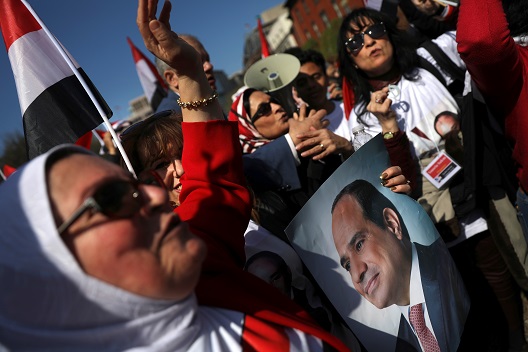 After years of condemning and rejecting what it considered an intrusive relationship, Egypt’s state media finally hailed a new era of bilateral relations between the US and Egypt ushered in by President Abdel Fattah al-Sisi’s first meeting with his US counterpart Donald Trump on Monday.
After years of condemning and rejecting what it considered an intrusive relationship, Egypt’s state media finally hailed a new era of bilateral relations between the US and Egypt ushered in by President Abdel Fattah al-Sisi’s first meeting with his US counterpart Donald Trump on Monday.
The White House had set the tone for Sisi’s visit beforehand, when it lauded the “bold steps on very sensitive issues since becoming President,” in a press briefing on Friday.
The statement relayed Trump’s support for Sisi’s “ambition to develop a comprehensive counterterrorism approach,” making his intention to ignore Egypt’s human rights record palpable.
Trump himself signaled the positive new relationship between both countries in a tweet on Monday following their meeting, expressing his honor in welcoming Sisi to the White House to “renew the historic partnership between the US and Egypt.”
Tuesday’s both state and independent newspapers in Egypt celebrated the new historic partnership, effectively marking the end of the tense relationship with the Obama administration, that further deteriorated with the ouster of Muslim Brotherhood president Mohamed Morsi and the election of Sisi into office.
Under the Obama administration, the US continuously criticized human rights violations committed in Egypt under Sisi, namely the crackdown on supporters of the Muslim Brotherhood, journalists and human rights activists. Egypt in turn rejected what it considered an interference in its domestic affairs.
Branding it a “US-Egyptian summit,” Egypt’s newspapers quoted Trump’s praise of Sisi and both presidents’ pledges to be one another’s ally.
Across its front page, state newspaper al-Ahram celebrated “A new leaf in US-Egypt relations,” in bold red font. The newspaper focused on the presidents’ shared goal to fight terrorism.
In the center of its pages, the newspaper also focused on the fanfare that welcomed Sisi in front of the White House, as it published pictures of Sisi’s supporters carrying his picture alongside Trump’s and waving Egyptian and American flags. Al-Ahram said that while there were hundreds of Sisi supporters who came in from across the US, the Muslim Brotherhood failed to mobilize its supporters for a counter protest.
Independent newspaper al-Watan focused on other regional topics both presidents discussed, namely the Israeli-Palestinian conflict and the Syrian crisis.
Sisi and Trump agreed on the necessity to maintain Syria’s unity and its army, the newspaper said.
Meanwhile, Youm7 also followed suit in dubbing it “a historic summit,” welcoming Trump’s promise that military cooperation between both countries will be at its “highest level.”
The main headline in Egypt’s other state newspaper al-Akhbar also lauded the “historic Egypt-US summit at the White House.”
In its coverage, al-Akhar boasted about the foreign media attention directed at Sisi’s visit to Washington, citing articles in the Washington Post, Bloomberg, the Telegraph among others, but however misconstruing the main objective of the articles.
Al-Akhbar cited an article published in the Washington Post by Brian Rohan, which it explains that Sisi sees eye to eye with Trump, as opposed to Egypt’s turbulent relationship with his predecessor Barack Obama.
While the article does shed light on similarities between both presidents, it is nonetheless a negative one. The article draws parallels between Sisi and Trump when it comes to vilifying other groups, and accusing – and in Sisi’s case arresting – journalists of spreading false news, among other resemblances in their discourse.
Al-Akhbar references another Washington Post article, an opinion piece by Robert Kagan and Michelle Dunne from the Brookings Institution and the Carnegie Endowment for International Peace respectively. Al-Akhbar said the article praised Sisi, adding that many members of Congress as well as in the Trump administration see him as an ally.
The original article however was articulate in its harsh criticism of Sisi, citing his “brutal repression” in Egypt, and his support of the Assad regime in Syria as well as Russian military presence throughout the region.
Unlike what al-Akhbar believes, foreign coverage of the Sisi-Trump meeting has been less than flattering, focusing rather on the reversal of US policy towards Egypt and the new administration’s intentional disregard for Egypt’s human rights record.
Referring to Sisi as an “authoritarian leader” in its headline, The New York Times highlights “a fundamental shift” in the US foreign policy, in which Trump prioritizes aligning with Egypt in the fight against terrorism over “concerns over its brutal suppression of domestic dissent.”
The same article takes a stab at both presidents, saying that Sisi is often mocked for “speaking in a rustic form of Arabic,” whereas Trump “has the grammar and vocabulary of a fifth-grade student.”
An editorial by The New York Times’ editorial board on Tuesday criticizes Trump for “celebrating one of the most authoritarian leaders in the Middle East … a man responsible for killing hundreds of Egyptians, jailing thousands of others and, in the process, running his country and its reputation into the ground.”
The editorial pointed out that Trump deliberately turned the other cheek to Sisi’s “abysmal human rights record,” adding that Sisi had been barred from the White House during the Obama administration.
Dalia Rabie is a journalist and one of the co-founders of Mada Masr. Her work was featured in Daily News Egypt, Egypt Independent and Mada Masr where she worked as an editor and reporter.
Image: Photo: Supporters of Egypt's President Abdel Fattah al-Sisi gather outside the White House prior to his arrival for a meeting with U.S. President Donald Trump in Washington, U.S., April 3, 2017. REUTERS/Carlos Barria

